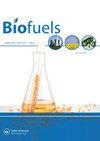适用于工业生物乙醇生产的新型耐热酵母
IF 2.6
4区 工程技术
Q3 ENERGY & FUELS
引用次数: 0
摘要
摘要:分离到一株能将100 g/L葡萄糖转化为46 g/L乙醇的耐热酵母。根据扩增18s核糖体DNA序列和NCBI数据库的blast检索结果,鉴定该分离物为毕赤酵母菌株。该菌株可在30 ~ 45℃条件下生长并产生乙醇,理论乙醇产率达90%以上,乙醇产量为2 g/L/h。菌株在37°C和42°C条件下分别在酸性pH为1.5和3时产生乙醇。在42°C时,菌株可以耐受高达10%的乙醇,当温度降低到37°C时,该菌株可以进一步增加到15%。Pichia kudriavzevii LC671435除了能够以与葡萄糖相同的效率从果糖中生产乙醇外,还可以利用花生和豆粕作为氮源生产乙醇。P. kudriavzevii LC671435在42℃下分别从100 g/L、160 g/L和200 g/L葡萄糖中产生0.47、0.45和0.40 g乙醇/g葡萄糖。当用于重复批量乙醇生产时,P. kudriavzevii LC671435在37°C和42°C下可生产46 g/L以上的乙醇至第五批。该分离物具有良好的耐热性,在不增加冷却成本的情况下进行高温工业发酵具有广阔的应用前景。关键词:生物乙醇发酵毕赤酵母耐热性披露声明作者未报告潜在利益冲突。本文章由计算机程序翻译,如有差异,请以英文原文为准。
Novel thermotolerant yeast suitable for industrial bioethanol production
AbstractA thermotolerant yeast capable of converting 100 g/L glucose to 46 g/L ethanol was isolated. The isolate was identified as a strain of Pichia kudriavzevii based on sequences generated by amplifying the 18s ribosomal DNA and a blast search on the NCBI database. The strain could grow and produce ethanol from 30 °C to 45 °C with theoretical ethanol yield above 90% and an ethanol productivity of 2 g/L/h. The strain produced ethanol at acidic pH of 1.5 and 3 at 37 °C and 42 °C respectively. At 42 °C, the strain could tolerate up to 10% ethanol which further increased to 15% when the temperature was reduced to 37 °C. Pichia kudriavzevii LC671435 could utilize peanut and soybean meal as nitrogen sources for ethanol production in addition to its ability to produce ethanol from fructose with the same efficiency as glucose. P. kudriavzevii LC671435 produced 0.47, 0.45 and 0.40 g ethanol/g glucose from 100 g/L, 160 g/L and 200 g/L glucose respectively at 42 °C. When used for repeated batch ethanol production, P. kudriavzevii LC671435 produced above 46 g/L ethanol up to fifth batch at 37 °C and fourth batch at 42 °C. With its thermotolerant ability, this novel isolate has great prospects for industrial fermentation at high temperature without additional cooling costs.Keywords: BioethanolfermentationPichia kudriavzeviiyeastthermotolerance Disclosure statementNo potential conflict of interest was reported by the authors.
求助全文
通过发布文献求助,成功后即可免费获取论文全文。
去求助
来源期刊

Biofuels-Uk
Energy-Renewable Energy, Sustainability and the Environment
CiteScore
5.40
自引率
9.50%
发文量
56
期刊介绍:
Current energy systems need a vast transformation to meet the key demands of the 21st century: reduced environmental impact, economic viability and efficiency. An essential part of this energy revolution is bioenergy.
The movement towards widespread implementation of first generation biofuels is still in its infancy, requiring continued evaluation and improvement to be fully realised. Problems with current bioenergy strategies, for example competition over land use for food crops, do not yet have satisfactory solutions. The second generation of biofuels, based around cellulosic ethanol, are now in development and are opening up new possibilities for future energy generation. Recent advances in genetics have pioneered research into designer fuels and sources such as algae have been revealed as untapped bioenergy resources.
As global energy requirements change and grow, it is crucial that all aspects of the bioenergy production process are streamlined and improved, from the design of more efficient biorefineries to research into biohydrogen as an energy carrier. Current energy infrastructures need to be adapted and changed to fulfil the promises of biomass for power generation.
Biofuels provides a forum for all stakeholders in the bioenergy sector, featuring review articles, original research, commentaries, news, research and development spotlights, interviews with key opinion leaders and much more, with a view to establishing an international community of bioenergy communication.
As biofuel research continues at an unprecedented rate, the development of new feedstocks and improvements in bioenergy production processes provide the key to the transformation of biomass into a global energy resource. With the twin threats of climate change and depleted fossil fuel reserves looming, it is vitally important that research communities are mobilized to fully realize the potential of bioenergy.
 求助内容:
求助内容: 应助结果提醒方式:
应助结果提醒方式:


